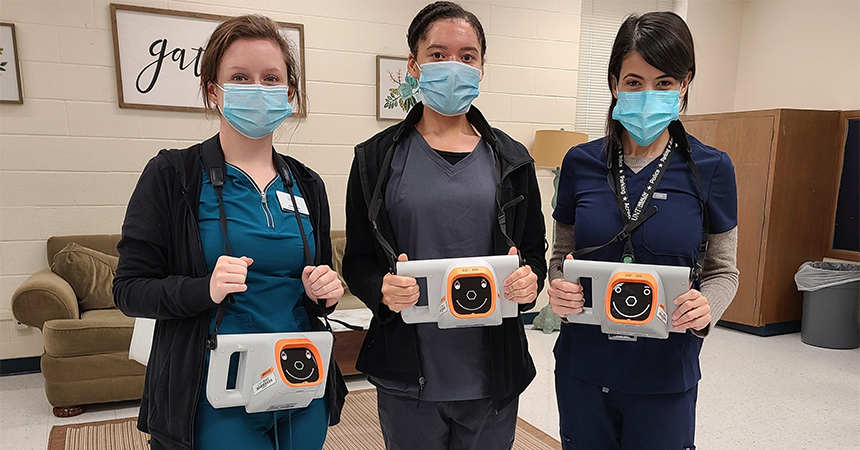NTERI and HSC students continue critical eye screenings during pandemic

The North Texas Eye Research Institute (NTERI) is making an impact in the community through free vision screenings and educational outreach.
Through a collaboration with the Fort Worth Independent School District (FWISD), NTERI performs state-mandated eye screenings for students under age six and with special needs, helping identify vision disorders at a critical stage of their learning.
“We know that nearly 80% of learning occurs through visual activities, so undetected and untreated vision problems can interfere with a child’s ability to perform at their full learning potential,” said Sima Mozdbar, OD, HSC Assistant Professor and NTERI Director of Community Outreach.
“Additionally, with these screenings, we are able to identify children at-risk of complications from conditions that may get in the way of their eyes developing properly and result in permanent vision loss if not treated in a timely manner.”
They use a handheld auto refractor screening device that analyzes images and provides a multitude of readings in merely one second per student. It’s similar to the device at the optometrist’s office where the patient is asked to focus on the hot air balloon image.
Pivoting During a Pandemic
Dr. Mozdbar emphasized that, particularly during the COVID-19 pandemic when routine visits to optometrists and pediatricians declined, children were at increased risk of undetected eye problems.
Despite the pandemic, NTERI and FWISD knew the work had to continue and quickly adapted to the challenges of training students and conducting the mandated screenings. And when the FWISD delayed return in the fall, the team had less time to complete them.
HSC student volunteers stepped up, and while adhering to strict COVID safety guidelines and minimizing close contact, they were able to conduct screenings at 37 schools, an increase over the previous year.
NTERI performed screenings for 2,568 students and detected vision problems requiring further attention in roughly one of every four students – problems that may have otherwise gone undetected.
“Early vision correction for these students could mean meeting a student’s eye care needs essential for their health, well–being and academic readiness,” said Presciliana Olayo, FWISD’s Coordinator of Vision Care Services.
She said the school district’s vision program initiatives aim to reduce health-related barriers, promote each student’s optimal level of wellness, and empower students and their families with the knowledge and skills needed to excel and achieve lifelong health and wellness.
“NTERI’s vision screening support means the ability for FWISD to meet this initiative and provide students with a basic need that is essential for their success both personally and academically.”
Students See Learning Potential
The screenings could not have taken place without the help of HSC student volunteers. NTERI works with an interdisciplinary team of HSC student volunteers to train them as certified vision screeners and to learn about the importance of routine preventative eye care.
“They bring a refreshing energy and passion to the volunteering events, and our robust team allows us to screen a larger quantity of students more effectively than we otherwise could,” Dr. Mozdbar said.
Annabel Luna-Smith, NTERI’s Mobile Health Coordinator, trained 42 HSC students in the past year, who completed 134 volunteer hours to make these screenings happen. She said the nurses have complimented their kindness, positivity and professionalism throughout the process.
Salma Omar, first–year TCOM student, volunteered a total of 10 days to conduct screenings.
“It has been a pleasure participating in an organization working so hard to uncover knowledge surrounding visual defects,” she said. “It has really helped me gain perspective with how pervasive vision abnormalities can be and why the work being done at NTERI is so important.”
Salma, along with fellow medical student volunteers, presented a poster on their findings on the relationship between demographics and visual anomalies in preschoolers presented at Research Appreciation Day (RAD). Their research demonstrated that minority children are more likely to need glasses and are at greater risk of complications, such as amblyopia, if they do not receive early treatment.
Bradley Atwood, a second-year student pharmacist, jumped at the chance to gain pediatric service-learning hours.
“I was eager to start strengthening my patient interaction skills with this population,” he said. “Additionally, these screenings play an invaluable role in helping students to thrive inside and outside of the classroom. Helping to screen for some of these disruptive vision problems was very rewarding.”
NTERI has continued screenings this semester and is expanding to other school districts.
“We’ve built a rapport with the nurses and partner schools, so we are growing,” said Luna-Smith.
Dr. Mozdbar said the state-mandated vision screenings are an essential element of a strong public health approach to vision care.
“While they do not take the place of a comprehensive eye examination,” she said, “they do allow us to incrementally expand vision care to children who are in need of care, so that they can ultimately receive comprehensive eye care and necessary treatment.”
Learn more about NTERI’s Mobile Vision Screening Program.
HSC is working to eliminate health disparities
HSC, driven by its core value to Serve Others First, is committed to helping deliver health care and improving access to all Texans through service and education.



![Uyen Sa Nguyen Scaled[58]](https://www.unthsc.edu/newsroom/wp-content/uploads/sites/16/Uyen-Sa-Nguyen-scaled58-145x175.jpg)

Social media